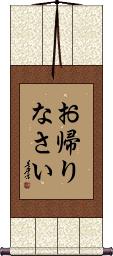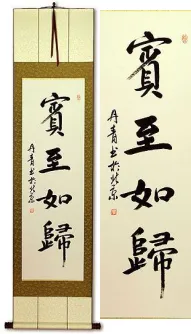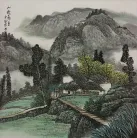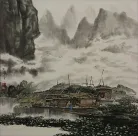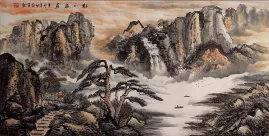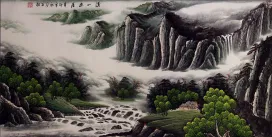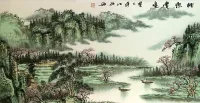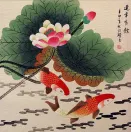Many custom options...
And formats...

Return Home in Chinese / Japanese...
Buy a Return Home calligraphy wall scroll here!
Welcome Home
お帰りなさい is a common Japanese way to say, “welcome home.”
This is said by a person greeting another as they return home. It's a typical phrase that is almost said by reflex as part of Japanese courtesy or etiquette.
Sometimes written as 御帰りなさい (just the first character is Kanji instead of Hiragana).
Note: Because this selection contains some special Japanese Hiragana characters, it should be written by a Japanese calligrapher.
This in-stock artwork might be what you are looking for, and ships right away...
Gallery Price: $120.00
Your Price: $79.88
Gallery Price: $100.00
Your Price: $49.77
Chinese Village Home Landscape Painting
Discounted Blemished
Gallery Price: $90.00
Your Price: $49.00
Chinese River Boat Home
Landscape Painting
Discounted Blemished
Gallery Price: $35.00
Your Price: $19.00
Gallery Price: $400.00
Your Price: $188.88
Gallery Price: $400.00
Your Price: $188.88
Gallery Price: $400.00
Your Price: $138.88
Gallery Price: $60.00
Your Price: $36.88
Gallery Price: $60.00
Your Price: $36.88
Gallery Price: $60.00
Your Price: $36.88
Gallery Price: $500.00
Your Price: $178.88
Not the results for Return Home that you were looking for?
Below are some entries from our dictionary that may match your Return Home search...
| Characters If shown, 2nd row is Simp. Chinese |
Pronunciation Romanization |
Simple Dictionary Definition |
不空 see styles |
bù kōng bu4 kong1 pu k`ung pu kung fukuu / fuku ふくう |
(given name, person) Fukuu Amogha, Amoghavajra. 不空三藏; 智藏; 阿目佉跋折羅 Not empty (or not in vain) vajra. The famous head of the Yogācāra school in China. A Singhalese of northern brahmanic descent, having lost his father, he came at the age of 15 with his uncle to 東海, the eastern sea, or China, where in 718 he became a disciple of 金剛智 Vajrabodhi. After the latter's death in 732, and at his wish, Eliot says in 741, he went to India and Ceylon in search of esoteric or tantric writings, and returned in 746, when he baptized the emperor Xuan Tsung. He was especially noted for rain-making and stilling storms. In 749 he received permission to return home, but was stopped by imperial orders when in the south of China. In ?756 under Su Tsung he was recalled to the capital. His time until 771 was spent translating and editing tantric books in 120 volumes, and the Yogacara 密教 rose to its peak of prosperity. He died greatly honoured at 70 years of age, in 774, the twelfth year of Tai Tsung, the third emperor under whom he had served. The festival of feeding the hungry spirits 孟蘭勝會 is attributed to him. His titles of 智藏 and 不空三藏 are Thesaurus of Wisdom and Amogha Tripitaka. |
回國 回国 see styles |
huí guó hui2 guo2 hui kuo |
to return to one's home country See: 回国 |
回家 see styles |
huí jiā hui2 jia1 hui chia |
to return home |
回門 回门 see styles |
huí mén hui2 men2 hui men |
first return of bride to her parental home |
家去 see styles |
jiā qù jia1 qu4 chia ch`ü chia chü |
(dialect) to go home; to return home |
帰る see styles |
kaeru かえる |
(v5r,vi) (1) to return; to come home; to go home; to go back; (2) to leave; (3) (baseb) to get home; to get to home plate |
帰着 see styles |
kichaku きちゃく |
(n,vs,vi) (1) return; arriving home; (n,vs,vi) (2) conclusion; (n,vs,vi) (3) {math;comp} reduction |
帰路 see styles |
kiro きろ |
return journey; one's way home; one's way back; (surname) Kiro |
帰郷 see styles |
kikyou / kikyo ききょう |
(n,vs,vi) homecoming; return to one's home |
旋里 see styles |
xuán lǐ xuan2 li3 hsüan li |
to return home |
晚歸 晚归 see styles |
wǎn guī wan3 gui1 wan kuei |
to return late; to come home late |
榮歸 荣归 see styles |
róng guī rong2 gui1 jung kuei |
to return home with honor |
歸る see styles |
kaeru かえる |
(out-dated kanji) (v5r,vi) (1) to return; to come home; to go home; to go back; (2) to leave; (3) (baseb) to get home; to get to home plate |
歸國 归国 see styles |
guī guó gui1 guo2 kuei kuo |
to go home (to one's native country); to return from abroad |
歸家 归家 see styles |
guī jiā gui1 jia1 kuei chia kike |
to return home |
歸宿 归宿 see styles |
guī sù gui1 su4 kuei su |
place to return to; home; final destination; ending |
歸根 归根 see styles |
guī gēn gui1 gen1 kuei ken kikon |
to return home (after a lifetime's absence); to go back to one's roots to return to one's roots |
歸省 归省 see styles |
guī xǐng gui1 xing3 kuei hsing |
to go home for a visit; to return to one's parents' home to pay respects |
生還 生还 see styles |
shēng huán sheng1 huan2 sheng huan seikan / sekan せいかん |
to return alive; to survive (n,vs,vi) (1) returning alive; surviving; (n,vs,vi) (2) {baseb} reaching the home plate |
返家 see styles |
fǎn jiā fan3 jia1 fan chia |
to return home |
返鄉 返乡 see styles |
fǎn xiāng fan3 xiang1 fan hsiang |
to return to one's home town |
送還 送还 see styles |
sòng huán song4 huan2 sung huan soukan / sokan そうかん |
to return; to give back; to send back; to repatriate (noun, transitive verb) sending home; repatriation; deportation |
還る see styles |
kaeru かえる |
(v5r,vi) (1) to return; to come home; to go home; to go back; (2) to leave; (3) (baseb) to get home; to get to home plate |
お帰り see styles |
okaeri おかえり |
(1) (honorific or respectful language) return; (interjection) (2) (abbreviation) welcome home |
十牛圖 十牛图 see styles |
shí niú tú shi2 niu2 tu2 shih niu t`u shih niu tu Jūgo zu |
(十牛圖序) The ten ox-pictures, the first, a man looking for an ox, then seeing its tracks, then seeing the ox, catching it, feeding it, riding it home, ox dies man lives, both dead, return whence they came and enter the dust. |
回娘家 see styles |
huí niáng jiā hui2 niang2 jia1 hui niang chia |
(of a wife) to return to her parental home; (fig.) to return to one's old place, job, school etc |
帰り路 see styles |
kaerimichi かえりみち |
the way back or home; return trip |
帰り道 see styles |
kaerimichi かえりみち |
the way back or home; return trip |
御帰り see styles |
okaeri おかえり |
(1) (honorific or respectful language) return; (interjection) (2) (abbreviation) welcome home |
返り事 see styles |
kaerigoto かえりごと kaerikoto かえりこと |
(1) (archaism) message that a messenger brings back home; (2) (archaism) reply; ode in reply; (3) (archaism) return gift |
Click here for more Return Home results from our dictionary
The following table may be helpful for those studying Chinese or Japanese...
| Title | Characters | Romaji (Romanized Japanese) |
| Welcome Home | お帰りなさい | okaerinasai |
Successful Chinese Character and Japanese Kanji calligraphy searches within the last few hours...
